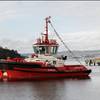Lonza Applauds U.S. Joining International Treaty
Lonza Applauds U.S. Joining International Treaty to Control Harmful Anti-fouling Coatings Systems on Ships
Lonza Microbial Control, which has long been an active supporter of an international treaty to assure the use of environmentally sound marine coatings products, applauds the United States’ formal approval of the International Convention on the Control of Harmful Anti-Fouling Systems on Ships. With the treaty having secured Congressional and White House approval, the U.S. will officially become a party to the treaty in November 2012.
The treaty is designed to eliminate harmful antifouling systems which pose a substantial risk of toxicity to ecologically and economically important marine organisms and specifically bans all use of organotin compounds which act as biocides in antifouling systems. Lonza Microbial Control’s Marine Paint business is one of the leading providers of environmentally- preferred marine coatings solutions that help control algae and other soft-fouling organisms.
“We thank everyone who helped move the treaty and its enabling legislation forward through the Congress to its final acceptance,” said Robert J. Martin, Global Marketing Manager for the Marine Paint business of Lonza Microbial Control.
Mr. Martin explains that, “By becoming a party to the treaty, the U.S. has a strengthened ability to prevent ships with Tributyltin (TBT) hull paints from docking or entering U.S. waters. This applies to all boats, including cargo ships, super yachts and recreational vehicles. The U.S. also will be able to participate in any future additions or modifications to the treaty, giving the nation a voice in discussions on the banning or control of other antifouling systems.”
“Proper anti-fouling systems are the very soul of sustainability,” Mr. Martin added. “By keeping ships’ hulls clear of foulants, the paints reduce friction and increase the ships’ speed through water, lessening the use of diesel fuel and related greenhouse gas emissions. The protective paints also lengthen the time between costly dry-dock maintenance. We’re always working to improve our antifouling compounds, recently introducing a new product where our copper Omadine® biocide is combined with a self-polishing polymer that exposes a new layer of antifouling actives as the outer layer of paint wears off, further extending the useful life of the paint.”













